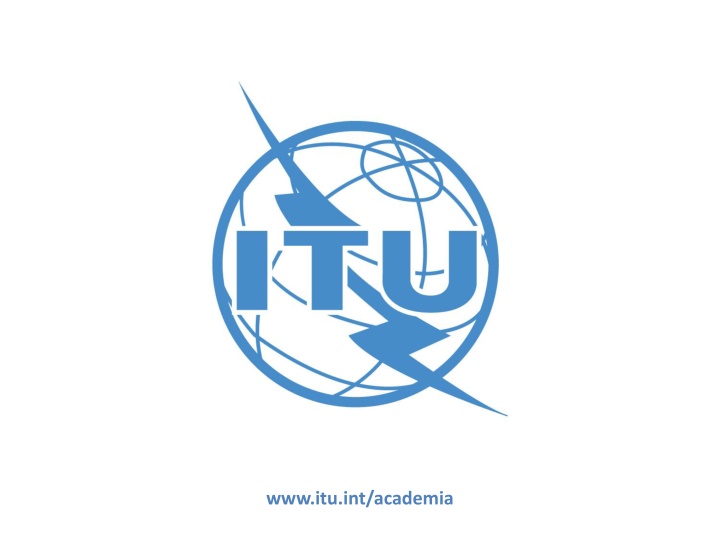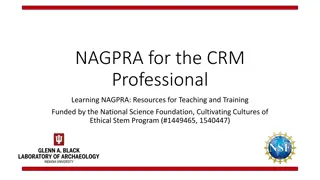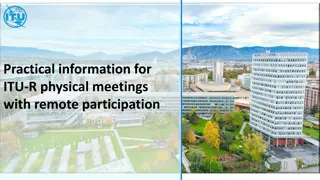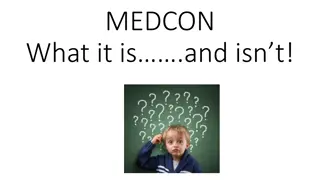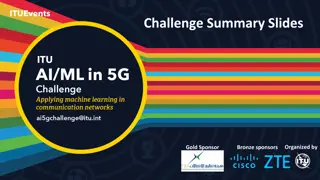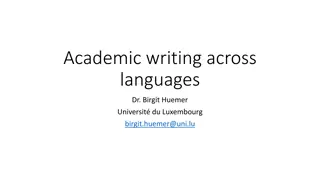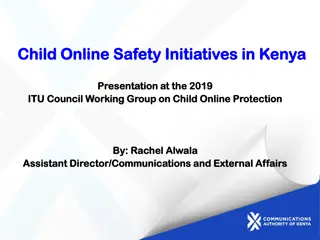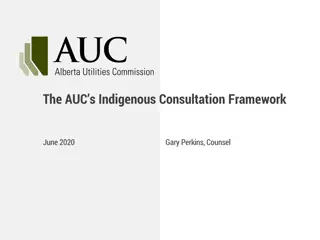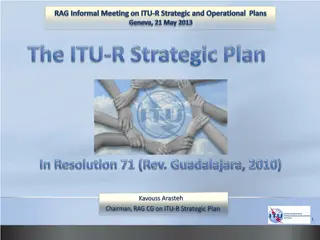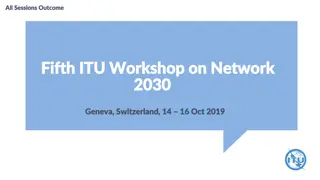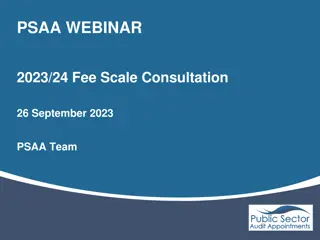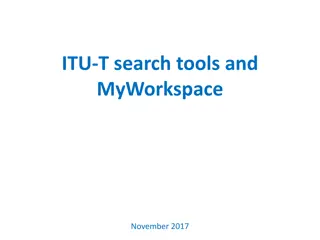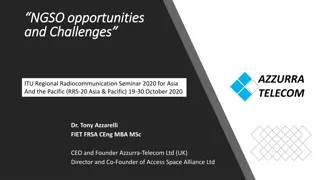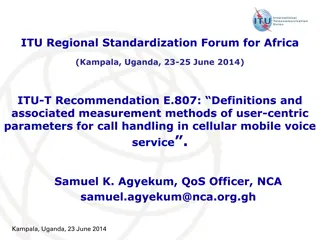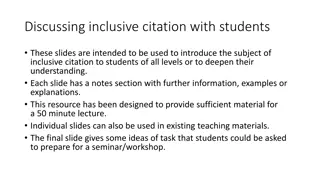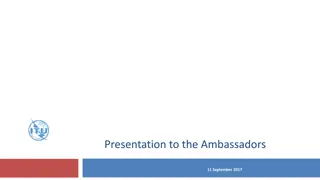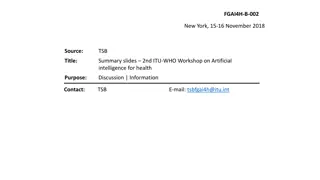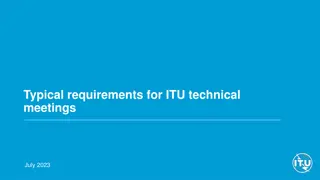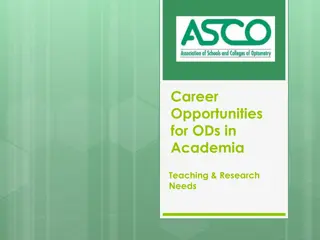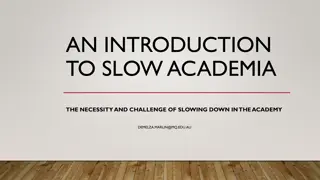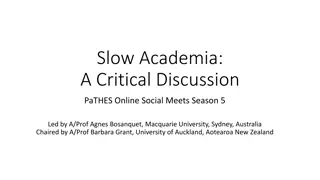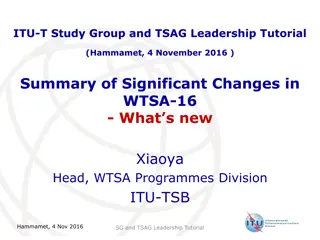Insights from ITU's Online Academia Consultation
Explore the outcomes of ITU's inclusive consultation with academia, focusing on exchanging views to meet academia's needs. Learn about the primary reasons to join ITU, the role of standards in education, challenges for academia, and notable journals. Discover the opportunities for collaboration, knowledge sharing, and standards development within the academic community.
Download Presentation

Please find below an Image/Link to download the presentation.
The content on the website is provided AS IS for your information and personal use only. It may not be sold, licensed, or shared on other websites without obtaining consent from the author.If you encounter any issues during the download, it is possible that the publisher has removed the file from their server.
You are allowed to download the files provided on this website for personal or commercial use, subject to the condition that they are used lawfully. All files are the property of their respective owners.
The content on the website is provided AS IS for your information and personal use only. It may not be sold, licensed, or shared on other websites without obtaining consent from the author.
E N D
Presentation Transcript
Outcomes of the online academia consultation Mr. Christopher Clark Head, Partnership and Resource Mobilization Division International Telecommunication Union www.itu.int/academia
Consultation Overview Inclusive approach of broad consultation with Academia The consultation provided opportunity to exchange views on what ITU can d o to best meet the needs and expectations of Academia. 18 universities and research establishments participated Questionnaire with 36 Questions Results are available in more detailed report to be shared www.itu.int/academia
Submissions: Regional Overview www.itu.int/academia
Primary reason to join ITU is Share knowledge; Contribute to Focus Groups, Research activities, Reports; Draft recommendations; Interact with other ITU members and look for collaboration/partnerships; Stay up-to-date about the sector s development; Access to the information and use it for teaching purposes Participate in activities organized by Academia Contribute to the standards development www.itu.int/academia
Role of Standards Standards play a significant role in the education overall, particularly when it is related to the research, best practices and teaching; Recommendations/Standards/Best Practices are used within academic network; The recommendations are cited in the research articles, however many indicated that there is more potential in this area. www.itu.int/academia
Main challenge for Academia in contributing to ITU s work www.itu.int/academia
ITU Journal Important journals for Academia include IEEE journals, regional and national journals as well as journals issued by universities; Examples of journals where universities are published: IEEE, ACM,IET, IETF, Hindawi, Elsevier, RTI,ICAO journal, Electrosvyaz, Radiotechnika, ITU News, Telecom Policy, journals published by Springer www.itu.int/academia
Type of articles and frequency The frequency of ITU Journal: monthly, quarterly or twice per year www.itu.int/academia
ITU Journals Structure Editorial (Review) board and/or Advisory (Review) Board and/or a Technical committee. Board should include mix of experts representing academia and industry. Experts should be identified from top universities and also representatives from industry, science and private sector. Indexing is crucial to the success of the journal The review of the ITU Journal should be ideally conducted blindly or through a Board/Technical committee. The examples: IEEE Journal (or equivalent)/ Kaleidoscope conference. Criteria: originality, relevance, pertinence, references, research methods, quality, innovation, applicability www.itu.int/academia
ITU Journals scope, incentives & audience Scope: It could be series of ITU Journal focused on 1) key ITU areas, or related to 2) the work of Study Groups 3) updates in ICTs and emerging trends 4) scientific papers 5) recs. Incentives: international and reputable citation indexes like Thomson Reuters, Web of Science, Scopus; referencing authors /institutions names in the publications; diploma/certificate The target audience for ITU Journal: 1) scientific community, researchers and ICT practitioners 2) policy makers and regulators, 3) academia and industry 4) students and graduates 5) public www.itu.int/academia
Recognition of academic contribution Participating in the update of recommendations Acknowledging contributions and referencing authorship Certificates Partnerships and collaboration Funding opportunity to cover travel expenses to meetings www.itu.int/academia
Future collaboration Partnering more with industry Contributing inputs to technical activities and research Sharing articles among academia Providing consulting services Networking among academia Participating in study groups, meetings and conferences Hosting events Publishing in the forthcoming journals, and Supporting developing countries www.itu.int/academia
Thank you academia@itu.int www.itu.int/academia
